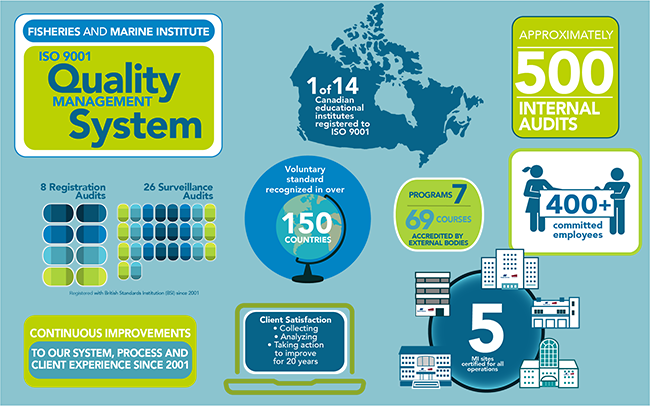News
Friday, October 14, 2022
Susan Knight starts each day asking, “how can we do better?”
Ms. Knight is the Quality Administrator in the Marine Institute’s Quality Office, a unique position within Canadian post-secondary institutions. Her role is to support the institute to continually develop, implement, maintain, review, and improve the effectiveness and efficiency of its certified Quality Management System. This ensures programs and services consistently satisfy the needs and requirements of students, clients and partners.
In 2001, MI received its ISO 9001 Quality Management System certification. Now after two decades, eight re-registration audits and over 500 internal audits, the Institute is reflecting on the importance and value of the certification to its operations.

Choosing ISO 9001
ISO 9001 is an international reference for quality management requirements, and a benchmark for improving customer satisfaction and achieving continual improvement of an organization’s performance.
The start of the MI Quality Management System began in 1998 when one of its centres developed a quality plan for a client proposal, followed by the development of a system built to the 9001:1994 Quality Management System requirement. Not long after, MI recognized the value of the system and work began in the early 2000s to create and adopt the system Institute-wide.
“Having ISO 9001 certification in the education sector is certainly unique,” said Ms. Knight. “Our system sets essential management and quality assurance practices that are applied to the design, development, provision and improvement of education and training, student support services, industrial and applied research, and industrial assistance at every level. Our long-standing commitment to our quality management system provides assurances to our students, clients, accreditation bodies and ourselves.”
“Every time we seek accreditation or are audited by an accreditation body, we look to our quality system to draw information,” explains Ms. Knight. “This is what our system supports and gives us an advantage in this process. It provides accreditation bodies, such Technology Accreditation Canada, the confidence that we have a structure in place for our operations, ensuring we understand and meet our clients’ and regulatory bodies' expectations and is verified internally and improved.
“The ISO 9001 certification is our mark of quality,” emphasized Skinner, MI’s associate vice-president (Administration and Finance). “As a management tool, it has helped us focus our business objectives and brought national and international recognition to our ocean education and research capabilities.”
Employee Commitment
Paul Brett, acting vice-president, Memorial University (Marine Institute) stated, “We strive to ensure our educational programs, research and development, and industrial support activities align with the needs and expectations of our students, alumni, industry partners, donors and other stakeholders,” explained Mr. Brett.
“For us, our Quality System is more than a group of procedures or checklists. It is a shared vision, a constantly evolving system embraced by our faculty, staff and researchers. They are the foundation to ensure it functions well and is improved upon organizationally for the benefit of everyone. It’s thanks to our employees and their leadership that we have maintained our certification and excelled in applying it.”
Making It Work
MI continually seeks to improve the effectiveness of the system through the use of quality policy, objectives, performance indicators, program review, internal audit program, client feedback and management review, just to name few.
MI’s Quality Office, internal auditors and its registration body, BSI, regularly collect data and information to analyze the suitability and effectiveness of the quality system and identify any improvements to the organization that would add value. The Quality office also works with the Institute’s schools and centres to demonstrate the system to national and international accreditation bodies and clients for several of the Institute’s programs, courses and industrial training offerings.
“Surveys and comment cards are also critical to our success,” explained Ms. Knight. “Their feedback keeps us close to the developing needs of the oceans sector and maintaining a high level of client engagement and satisfaction.”
Future Commitment
Mr. Brett thinks those reasons are vital to maintaining the Institute’s commitment it made to ISO 9001 over twenty years ago.
“As we build our global leadership in ocean education and research, we will look to our quality management system to support our people and technology, engage with our partners effectively and ensure our academic and industrial programming are at the highest quality expected by the oceans sector.”





